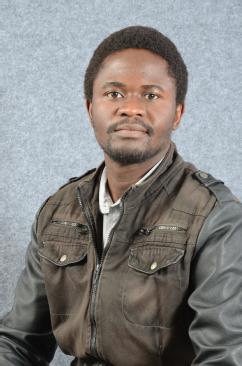Dr Pedzisai Maedza
 Newton International Fellow
Newton International Fellow
Email: Pedzisai.Maedza@gmail.com
ORCID iD: https://orcid.org/0000-0001-6980-3272.
Post-Doc Supervisor: Dr Yvette Hutchison
About
Pedzisai Maedza is an Intercultural Performance Scholar and a Newton International Fellow in the School of Creative Arts, Performance and Visual Cultures at the University of Warwick. He holds a PhD from the Centre for Theatre, Dance and Performance Studies at the University of Cape Town, South Africa, completed through a DAAD research stay at the Institute for Anthropology and African Studies at the Johannes Gutenberg University-Mainz, Germany. He is the author of Performing Asylum: Theatre of Testimony in South Africa (African Studies Centre, University of Leiden, 2017) and has published several book chapters and peer-reviewed articles in internationally recognised journals on Performance and Cultural Studies.
His interdisciplinary research is located at the intersection of Performance, Genocide and Cultural Memory Studies focusing on the cultural study of Performance, Politics, Society and Memory predominantly within Southern Africa. His work examines how Performance as Cultural Memory shapes and informs how violence and genocide is remembered and commemorated. He investigates how postcolonial communities use performance to resist, transmit and contest the archival erasure of the memory of colonial genocide across time and space. In particular, his research interrogates how theatre and other artistic performance representations and interpretations inform the way societal history and sensibilities, the present and the future are presented and remembered.
Research Interests
African Theatre, Cultural Memory Studies, Genocide Studies, Performance Studies, Theatre Historiography
Current Research Project funded by the British Academy
Chains of Memory in the Postcolony: Performing and Remembering the Namibian Genocide
This project analyses how the Namibian Genocide, committed in the early 20th century by German colonialists, is remembered through performance. German involvement in the colonisation of the African continent broadly, and of Namibia in particular, is sometimes characterised by ‘social amnesia’. When Germany’s colonial role is mentioned, it is often in passing reference to the legacy of the 1884 to 1885 ‘Scramble for Africa’ Berlin Conference. What often escapes attention is the fact that between 1904 and 1908 German forces launched a military campaign to exterminate all resistance to the colonial takeover of Namibia. This annihilation campaign employed concentration camps, ‘racial hygiene’, Eugenics and other medical experiments orchestrated by individuals like Eugen Fischer. The legacy of the genocide includes the Nazi Nuremburg race laws of 1935, upon which South Africa’s Apartheid laws were modelled. These legacies still resonate on the African continent and in Germany today.
This research explores the ethical, aesthetic and performance dimensions of how this 'forgotten' 1904 to 1908 genocide is translated into public memory, and how this memory replaces the genocide itself. It examines the im/possibility of representation in the aftermath of acts of genocide; suggesting that, while the Namibian genocide has so far been denied official state acknowledgement, through the medium of performance the genocide memory is being remembered, contested and performed within Namibia and the diaspora. The project suggests that remembrance is performative, and that performance envelops time and creates an alternate historiographic repository for genocide memory. Performance is an exercise through which knowledge of the past not only endures but is transmitted across societies and generations.
Publications
Monograph
Maedza, P. (2017). Performing Asylum: Theatre of Testimony in South Africa. African Studies Centre, University of Leiden, Netherlands.
Journal Articles
Maedza, P. (2019). SOLD!: Re-staging Dance, Death and Disability. TDR: The Drama Review, 63:4, pp.181-188. DOI: https://muse.jhu.edu/issue/41368 .
Maedza, P. (2019). ‘Gukurahundi - A moment of madness’: Memory rhetorics and remembering in the postcolony. African Identities, pp.1-16. DOI: https://doi.org/10.1080/14725843.2019.1657000.
Maedza, P. (2019). Third Time Lucky: Freshlyground and Cross-border Censorship in Zimbabwe. Popular Music and Society, 43.5, pp.1-19. DOI: https://doi.org/10.1080/03007766.2019.1651561.
Maedza, P. (2019). Sarafina!: The Children’s Revolt From Soweto to Broadway. South African Theatre Journal. pp.1-22. DOI: https://doi.org/10.1080/10137548.2018.1544503 .
Maedza, P. (2018). The Line: Committing and commemorating ‘the crime without a name’. South African Theatre Journal. pp.1-13. DOI: https://doi.org/10.1080/10137548.2018.1473791
Maedza, P. (2017). ‘Mai VaDhikondo’: Echoes of the requiems from the killing fields. Social Dynamics, 43:2, pp.215-229. DOI: http://dx.doi.org/10.1080/02533952.2017.1364470.
Maedza, P. (2017). The Kaiser’s concubines: Re-membering African women in eugenics and genocide. Free University Berlin, PhiN-Beiheft 13/2017 pp.159-181. DOI: http://web.fu-berlin.de/phin/beiheft13/b13t09.pdf.
Book Chapters
Maedza, P. (2018). ‘Call the riot police! Girls are dancing!’: Reflections on the law, censorship and female dance(r)s, in Victors, Victims and Villains: Women and Musical Arts in Zimbabwe’s Past and Present. Edited by Bridget Chinouriri, University of Zimbabwe Publications, pp.180-199.
Maedza. P. (2015). (Re)-membering the Cape and the Performance of belonging(s), in Performing Migrancy and Mobility in Africa: Cape of Flows. Edited by Mark Fleishman, Palgrave Macmillan, pp.97-109.
(Video links to selected creative outputs are available upon request)
Grants and Awards
The British Academy Newton International Fellowship (2021-2023)
African-German Network of Excellence in Science (AGNES) Junior Researcher Award (2019)
TDR: The Drama Review Annual Student Essay Contest- Finalist (2018)
University of Cape Town Rosalie van der Gucht Scholarship (2018)
Sulzmann Foundation Fellowship, Johannes Gutenberg University Mainz (2017)
Social Science Research Council (SSRC)-New York, Next Generation in Africa (2016 – 2019)
German Academic Exchange Service (DAAD), Johannes Gutenberg University Mainz (2016 – 2017)
University of Cape Town Rosalie van der Gucht Scholarship (2015 – 2016)
Canon Collins Trust Scholars’ Scholar Award (2014 – 2016)
University of Leiden, African Studies Centre - Africa Thesis Award (2014)
International Federation for Theatre Research (IFTR) New Scholars Award (2014)
University of Cape Town International Scholarship (2014)
University of Cape Town Research Associateship (2013)
Great Zimbabwe University Staff Development Fellowship (2012 – 2014)
University of Zimbabwe Book Prize (2007 – 2009)
Professional Associations
International Federation for Theatre Research (IFTR), member
African Theatre Association (AfTA), member
Qualifications
PhD (University of Cape Town)
MA (University of Cape Town)
BA Honours (University of Zimbabwe)
